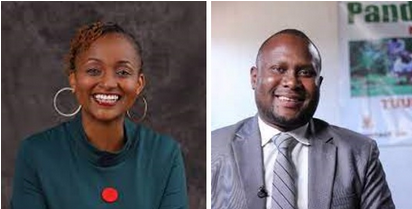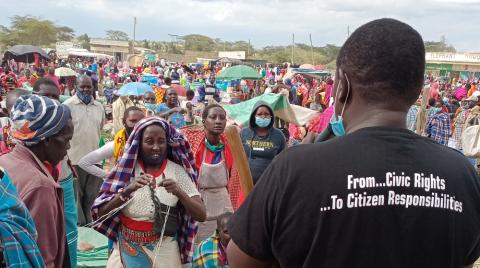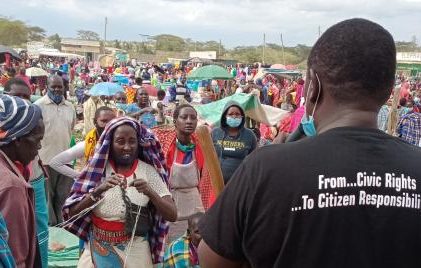
The #ShiftThePower movement is picking up momentum, gathering strength and moving at an amazing pace.
Communities and donors have started to talk about it. We are seeing the energy, motion, relationships, reach, connections, direction, trends and facilitation being done. The new look at development, changing mind-sets, trying new alternatives for enduring communities is in the works.
Local community foundations and organizations now understand that to survive with minimal external aid (foreign / out of country funding), you must strengthen your critical infrastructure for growth. You must invest and build strong foundations that will propel such entities to be truly locally rooted, owned, financed and run.

Lessons from Kenya
Encouraged by the Kenya Community Development Foundation’s (KCDF) consistent and persistent push to grow a strong resilient movement of local community foundations, many little-known organizations are joining this movement. The recent entrants are the Nguzo Africa Community Foundation and Kilimani Project Foundation whose leaders have undergone a six-month 2022 #ShiftThePower Fellowship programme organized by the GFCF.
Indeed, for a long time, development has been driven by foreign international donors, who have used such opportunities to push their agenda. Communities have remained passive receivers of aid, with minimal roles of influence on how development should be delivered.
“The current (and common) structural design of development programmes is disruptive for communities and characterized by short term project cycles addressing singular problems, communities abandoning their priorities and aligning themselves to international development priorities, and a weak civil society ecosystem that can’t survive without Overseas Development Aid (ODA), meaning that many issues that communities deem important and of priority, are neglected,” – KCDF.
Do you remember a story of a powerful horse that remained at the same spot, tied by a simple thread? That is the situation in Kenya. Many community organizations are stuck in the same position waiting to be untied by foreign aid. Many do not know that they are powerful. Many are not aware that the string that holds them is so weak, and it doesn’t stop them from moving and doing what they aspire to achieve.
By strengthening the #ShiftThePower and community foundations movement, we tend to remove those fears and create a network of community champions who can question and influence how development should be delivered in communities.
So how do we plan to grow the #ShiftThePower movement in Kenya?
Here is a list of suggested actions that will help to move this movement to another level.
- Create awareness about the #ShiftThePower movement. Here we plan to create awareness of the movement using online and offline engagements. Writing articles, podcasts and videos on how community-led development is changing communities for good. This awareness shall be divided into two: one targeted at the donor side and the other the community-receiving side.
- Mapping and profiling critical local partners who are ready to join the movement and get supported to shift their models and strategies to fit the characteristics of community foundations. For a start this can be done in more than 24 counties across Kenya. Support will be offered across counties, where we shall have at least one community-led development champion organization in each of the 47 counties in Kenya.
- Get critical support partners from the donor side, ie. the donors and bilateral agencies who are keen to support the growth of the #ShiftThePower movement. Their support will be highly appreciated. Working with donors and community organizations is key to understanding painpoints and building pathways for growth.
- Systems strengthening for local organizations. This will include support to develop organization’s systems, strategies and governance processes to create enduring, durable and resilient organizations.
- Monitoring progress. This will entail looking at the changes that need to be implemented from the community side. For instance, how many community organizations are onboarding #ShiftThePowerstrategies in their work processes, strategies and approaches. At the same time we shall monitor how international non profits are shifting their approaches. How many are mentoring local organizations? How many have changed their business model and become mentors and convenors and not direct conduits of aid to communities? It is important for community organizations to start undertaking social accountability audits for development aid resources.
Conclusion
What if our passive communities and struggling community organizations knew their power and accepted the new norms in sustainable development delivery? What if change agents invested in strengthening critical infrastructure for community foundation resilience?
We are sure that although movement building takes time, it remains a viable option to trigger new thinking on how development should be thought, designed and delivered. It is our responsibility to give all and commit to support this movement and create strong, resilient community organizations ready to create positive impact in our communities.
The continued advocacy around community-focused work and systems change within the aid sector will be centered upon the ability of communities to shape and drive dialogue about the type of development they want. The ability for us in the community development and philanthropy sector will be to be guardians and custodians of this change. We must guide the communities towards a rethinking and reimagining of how community ownership of problem-solving is leading to a paradigm shift in the development sector.
As #ShiftThePower champions, let us lead from the front: leading processes of learning, unlearning and relearning about development and how it has been done over the past decades, then reimagining what the future holds for us at the hyper-local level and really unlock the potential that sits there, untapped and sometimes unknown to many a community, much to their desperation and disillusionment.
We must go beyond the hashtag, have open and authentic conversations, first with ourselves, about how we do what we do and then with the communities we serve, about how we can do it better. Then and only then can we step out boldly and audaciously to live and prosper in the true spirit of shifting the power to the people who need it the most.
Wanjiru Kanyiha is the Executive Director of the Kilimani Project Foundation and Elizaphan Ogechi is the Executive Director of the Nguzo Africa Community Foundation. Both Elizaphan and Wanjiru were #ShiftThePower Fellows over 2022.
